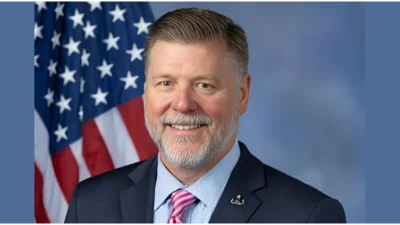Congressman Matt Cartwright (D-PA), Chairman of the Commerce, Justice, Science, and Related Agencies Appropriations Subcommittee, delivered the following remarks at the Subcommittee's hearing on Violent Extremism and Domestic Terrorism in America: The Role and Response of DOJ:
We meet today to explore a crisis of grave concern to this subcommittee and the American people: the rise of domestic terrorism and extremist violence in our country; the threat it poses to public safety, free speech, the rule of law, and our core democratic principles. We will also discuss how the Department of Justice and the FBI are addressing the crisis.
The January 6th riot and insurrection perpetrators are not, sadly, part of an insignificant minority. Whether actors have been “lone wolves" or conspiring and acting in groups, this is a growing and metastasizing blight on our society.
We, as Members of Congress, all personally experienced the January 6th insurrection, and we owe it not only to the people of our country, but to the democratic institutions in which we serve to ensure such an event never happens again.
The attack on the Capitol took domestic terrorism to a level that must not be downplayed. As FBI Director Wray testified to the Senate Judiciary Committee in March, “January 6 was not an isolated event. The problem of domestic terrorism has been metastasizing across the country for a long time now and it’s not going away anytime soon."
All the evidence of the past two years, documented in the comprehensive database of terrorist incidents maintained by the Center for Strategic and International Studies, shows that rightwing extremist attacks and plots have greatly outnumbered those from all other groups combined and caused more deaths.
Since 2015 white supremacists, extremist militia supporters and like-minded individuals involved in 267 plots or attacks and 91 fatalities, while incidents alleged to be from all other groups accounted for 66 incidents leading to 19 deaths, including only 5 percent associated with Salafi-jihadists (the lowest share since 2008). And the CSIS data show that the January 6 breach was just one of eleven far-right terrorism attacks in January- the most for any January on record.
Despite all this evidence, we have had to deal with uninformed public commentary, and even intentionally inflammatory words from leaders who seek to deflect outrage or resort to “what-aboutism" tactics to seek to minimize news about this crisis.
Some, infamously, after domestic terrorism incidents use terms such as “fine people on both sides". And our law enforcement agencies, including the FBI, need to revise bureaucratic mindsets and catch up to these new threats and our new reality in their investigative efforts, as suggested by former DEA Administrator and FBI Chief of Staff Chuck Rosenberg.
Attorney General Garland said recently, in reference to his role as the lead prosecutor in the 1995 Oklahoma City bombing case, “I have a chance to lead a department … that needs to fight against domestic violent extremists, so that the kind of tragedy that we had in Oklahoma City doesn't occur."
We on this subcommittee want to help the Attorney General and the Department of Justice win this fight.
To do that, we welcome two senior leaders from the Department of Justice: Executive Assistant Director Jill Sanborn leads the FBI National Security Branch, is a veteran of the efforts to deal with terrorism at home and abroad, and was the first woman to lead the FBI’s Counterterrorism Directorate.
Deputy Assistant Attorney General Brad Wiegmann represents the National Security Division, which was established in 2006 to consolidate the Department’s primary national security operations, and to ensure that Federal counterintelligence and counterterrorism activities don't violate the law.
And for today, so that we are on the same page in describing domestic terrorism, we will use the definition the FBI provided in a July 2020 report to the Subcommittee, which described “domestic violent extremists" as those who pose a persistent threat of violence and economic harm, but distinct from those connected with international terrorism.
And of these, the greatest threat is from “Racially or Ethnically Motivated Violent Extremists" -- especially White supremacists.
Because this hearing is in open session, we understand many matters of interest to the subcommittee may be too sensitive to discuss in detail. I believe we can have a fruitful and informative session at the unclassified level, but should some answers need to be handled under secure procedures, the subcommittee can certainly accommodate that requirement.
Executive Assistant Director Sanborn and Deputy Assistant Attorney General Wiegmann, we look forward to your testimony.
Source: U.S. Department of HCA








